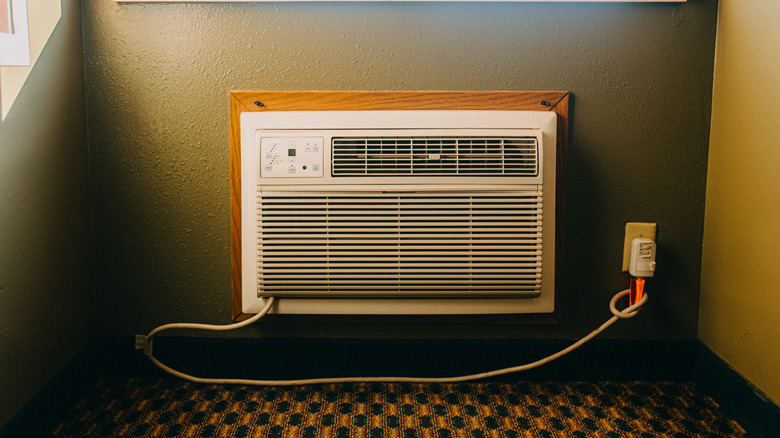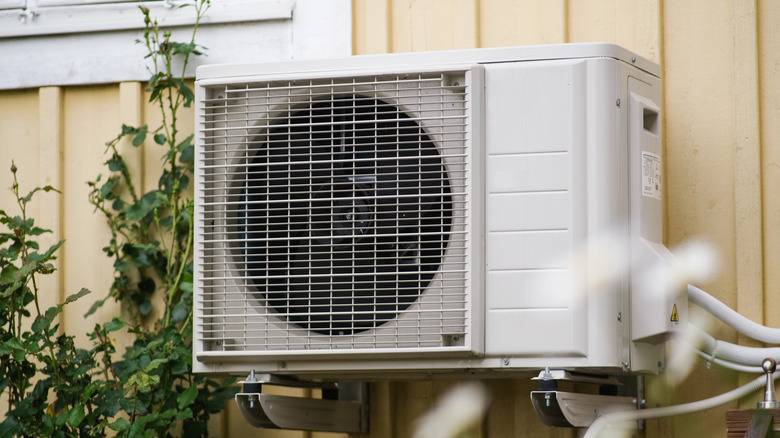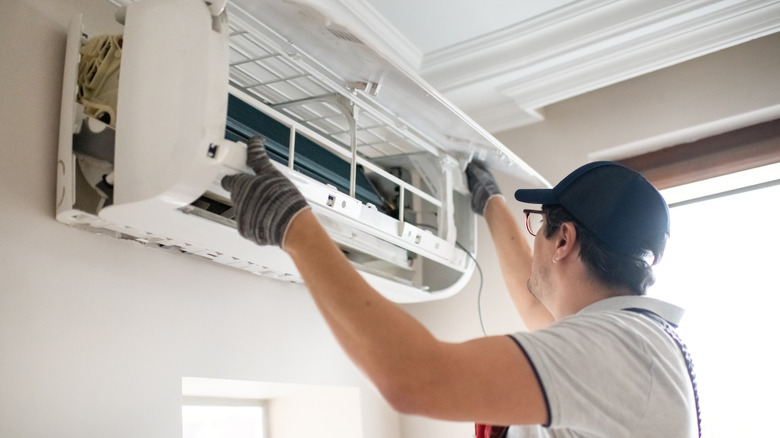Is It Worth Buying And Installing A Secondhand Air Conditioner?
When the weather starts heating up, there's no appliance more important than your air conditioner. Almost 90% of all homes in the U.S. have some form of air conditioning, with over 50% of homes using AC in every state except Alaska. If you're looking to replace your old one, or if you just moved and you need to figure out a new cooling situation, you may be looking at purchasing secondhand. But is it worth it?
Some sources will tell you never to buy a secondhand air conditioner, but frankly, a lot of those sources are also trying to sell you a new air conditioner. There are pros and cons to pre-owned ACs, but in short, whether it's worth it depends on your living situation and what type of air conditioner you're planning to use. If you're in a temporary situation or only planning to use a window unit, secondhand is likely fine if you can find a verifiably functional unit that's less than 10 years old. But if you're looking for central AC for a more permanent living situation, the drawbacks can start to outweigh the benefits of buying used thanks to the costs of repairs and installation.
Pros of buying a secondhand air conditioner
The most obvious pro is that buying older mechanical appliances is better for your wallet. A new window unit can cost anywhere from around $150 to $800, or even higher for units with fancier features built for larger spaces. Central AC is still more costly, with the average unit coming in at nearly $6,000 as of 2024. Secondhand ACs typically come at a fraction of this price. Also, because you're not limited to what's in stock at a specific store, you may have options accessible to you that aren't available in retail stores — whatever you can find, you can buy.
Buying an air conditioner secondhand also doesn't have to mean buying an old run-down unit off Craigslist. Sites like BackMarket sell certified refurbished ACs, and some refurbishers may even give you a warranty, which is an extra special find when buying used. Even if you're buying used from an individual, sometimes it's not because the AC is broken — maybe it was just the wrong size for their home, or they're upgrading and need to offload their perfectly good old one. If an HVAC technician has inspected it to verify its condition, you'll have even more peace of mind.
On top of the upfront savings, using a pre-owned air conditioner is more environmentally sustainable. The worldwide amount of waste from electronics is on the rise, and keeping someone's old unit out of a landfill is more eco-friendly than buying a new one.
Cons of buying a secondhand air conditioner
While buying an air conditioner secondhand saves money upfront, you may end up spending more down the line for maintenance, repairs, and installation. Things like mold or rusty coils are easier to spot, but your AC may come with unseen issues that can be costly to repair, especially with central air. Also, the price of the unit doesn't typically include installation, and that can be a hassle — for labor alone, professionally installing a window unit costs around $150 to $300, and installing central AC can cost $1,000 to $2,500 or more if you need to install ductwork.
You'll be in an even more difficult situation if the manufacturer is no longer producing replacement parts and in the likely event that your used AC doesn't come with a warranty. Be aware of the age of the unit, too; a properly maintained air conditioner lasts an average of 15 to 20 years, but anything older than 10 years was manufactured with different Department of Energy regulations, meaning lower efficiency and higher energy bills.
Make sure whatever AC you purchase has the proper specs for the space it's meant to cool. Cooling power is measured in British Thermal Units (BTUs), and you'll generally need 20 BTU for each square foot of living space. If a seller isn't specifying their unit's BTU, it may be best to look elsewhere. Overall, secondhand ACs can be an effective cost-saver for some homes, as long as you keep these considerations in mind.


